The Good, the Bad, and the Furry Read online
Page 3
When my second childhood cat, Tabs, was run over, in 1986, my dad had sprung into action and protected me, making sure I was locked inside the house as he took her body from the side of the road and buried her in the garden. In a way, when one of our animals dies in a vet’s surgery, the vet performs a minor version of the role my dad played that day: they’re parents, for just a few minutes. But when a cat dies at home, we’re alone – even more so when we live on our own, and none of our closest friends are within twenty miles of us. I can honestly say that in the next two hours I felt more isolated than I had in my entire life. I wondered about going over to see Deborah and David next door, who’d both loved Janet and had even recently shot a home video of him on their decking, running away from a pheasant. But they would probably both be at work. ‘Should I call the vet?’ I’d wondered when I found Janet. ‘No,’ I chided myself. ‘That would be ridiculous.’ What did I expect them to do? My local surgery didn’t have paramedics, or its own ambulance. I called my lovely mum, who was terrific and calmed me down, even though, being several counties away, she probably felt a bit helpless herself.
I carried Janet across the lawn – his weight, more than restored, in death, to what it had been in the prime of his life, came as a shock – and buried him under the apple tree at the bottom of the garden. It was one whose branches he and Shipley used to like to race up and down in pursuit of one another. In my tear- and rain-stained grief, I still found a second or two to wonder if a previous owner of the house had ever buried a pet here before, and thought of a story my friend Jackie had told me about her cat Martha, who’d died the previous year. While burying Martha, in similarly sodden conditions, on the hillside where she lived in Pembrokeshire, poor Jackie had accidentally dug up the skeleton of Martha’s brother, Arthur, who’d died seven years earlier after being hit by a car. ‘I must have looked a right state,’ she told me, ‘standing in the rain, covered in mud, bawling my eyes out, holding the corpse of one cat and the skeleton of another. It’s a good job nobody was walking along the footpath at the time.’ I thought with horror and sympathy about the people out there who are truly alone when an animal dies – who, unlike Jackie and me, don’t have the comfort of loving family, or the knowledge that, even though they live a bit out of the way, before long they’ll see friends who’ll help them feel better.
So: my cat had died, it was raining, and I was momentarily isolated, but part of me still knew it could be worse. ‘It could be worse’: I couldn’t remember having said that very much in my first twenty-five years on the planet, but it is so often the reassuring mantra of adulthood. And what I was experiencing now really was adulthood, in a more extreme way than I’d ever experienced it.
People have a lot of different definitions of what makes you a proper grown-up. Some claim it’s getting your first car or losing your virginity. Others think it’s buying your first house or having your first child. For me, it was the moment when alone, in the pouring rain, far from nearly all of the people I loved, I buried my cat, twenty minutes after holding him in my arms and watching him die.
As I tramped back up the steep garden towards the house, I saw The Bear staring down at me from the living-room window. With his huge saucer eyes and the rain running down the glass, you could have set the scene to music as the climactic montage in a heartbreaking Hollywood movie. If you’d never met him before, you’d have been sure he was in mourning. But The Bear always looked like that. He was the only cat I’d ever seen who appeared to be almost permanently on the verge of tears. He’d never exactly disliked Janet, but had suffered him as the painfully intelligent have always suffered the trivial and frivolous. Would he be sad without him? Perhaps. But in his deep, mysterious, faintly omniscient way, I imagine he probably had known it was coming.
I arrived inside and sat beside him. I was struck, as so often, by how well he had aged. His ears looked a bit like they’d been nibbled by a large rabbit who’d mistaken them for a couple of small black lettuce leaves, but, even if his eyes were impossibly sad, they were bright too, and his fur was much shinier than it had been when I’d first met him. I picked him up and he clung tightly to me, as if holding on for dear life. Again, probably nothing to do with the circumstances of the moment. The Bear always clung tightly to the chests of those he liked as if holding on for dear life. ‘Wow, man,’ Michael the folk musician with the cape, who’d looked after him for a while, had once said. ‘That was intense when I first cuddled him. I don’t think I’ve ever felt anything like that from a cat before.’ That was a decade and a marriage ago, but I still felt the same thing, every day.
‘Just the four of us now, then,’ I said, and he began to purr.
* * *
The following day, after an evening spent with my supportive friends in Norwich, I noticed something odd: the sick outside the back door was gone, leaving no trace of its long and clinging tenancy. Mary and Will would be pleased and vindicated to find out. Had it already vanished yesterday? I couldn’t say, as I’d been too fogged by grief to notice. You could say the rain was probably responsible, but there had been heavy downpours several times during the last few weeks and they hadn’t succeeded in shifting it. To me it all seemed a bit suspicious. One day, I’ve got a load of vomit outside my back door and no willing, hungry foxes in the neighbourhood. The next day, my cat, who once happened to be best friends with a very thin, old fox, badly in need of sustenance, dies. The day after that, I’ve got absolutely no vomit outside my back door.
Alongside the one that involved me telling myself that Janet did not suffer for long, it became one of the positive thoughts I tried to focus on, in the days that followed: maybe he had finally been reunited with his old (not all that) bushy-tailed friend from London? I pictured the scene: Janet’s immortal soul leaving his body, climbing into the apple tree and spotting the fox’s immortal soul trotting across the lawn.
‘You certainly took your time,’ says the fox’s immortal soul.
‘I was busy. What can I say? We moved house a lot. There was a break-up to deal with. Life gets in the way, you know,’ says Janet’s immortal soul.
‘I just found some really tasty vomit by the door, on my way here,’ says the fox’s immortal soul.
‘That came from me!’ says Janet’s immortal soul.
‘Ooh, thanks! Very good of you,’ says the fox’s immortal soul. ‘There were a couple of voles, too, but they were a bit wet and chewy, and one was technically just a vole’s bottom.’
‘Yeah,’ says Janet’s immortal soul. ‘Shipley likes to eat their faces. Don’t ask me why. He’s a massive weirdo.’
‘Anyway, let’s not hang around,’ says the fox’s immortal soul. ‘I’ve got lots to show you.’
‘Great!’ says Janet’s immortal soul. ‘I’m excited.’
‘Just watch you don’t set fire to your tail when you pass through the fiery vortex separating this dimension from the next,’ says the fox’s immortal soul. ‘I did that in 2002 and the fur I lost took ages to grow back.’
‘Gotcha,’ says Janet’s immortal soul.
Just before they leave, Janet’s immortal soul pauses. It has a worried look on its face. ‘Shit!’
‘What’s wrong?’ asks the fox’s immortal soul.
‘You just cost him a tenner.’
The Ten Catmandments
Thou shalt have no other gods before thyself.
Thou shalt not kill, or at least if thou art going to kill, thou shalt have a game of football with the thing thou is going to kill before thou properly finishest it off.
Thou shalt repeat the internal mantra ‘I hate this! It’s fucking great!’ about the majority of life experiences.
Thou shalt not drink the water put out for thee by thy humans. Thou shalt instead demand to drink the freshest water in Christendom straight from the tap, although if that is not forthcoming, thou shalt protest by drinking any old rainy, algae-spattered crap thou might find in next door’s garden.
Thou shalt ignore any toy th
y human has bought for thee, especially the really expensive ones, but thou shalt dearly cherish the packaging of said toy, and have hours of fun with it.
Thou shalt forget thy mother and father quite quickly when separated from them, and, if thou happens to see them again, thou shalt sniff their bottoms then hiss at them intimidatingly.
Thou shalt snack voraciously, stealing at least one fish before the age of three, always remembering to leave something black and hard to remove behind after every meal, and getting irrationally excited when thy biscuit dispenser is topped up, even though thy new biscuits are just the same as those underneath.
Thou shalt not commit adultery, except in a kind of ‘dry hump’ way, with thy owner’s cleanest knitwear and bedding.
Thou shalt not covet thy neighbour’s cardboard box.
Thou shalt never forget the rule that thy affection towards thy human should rise and fall in direct proportion to the amount of miscellaneous crap stuck to thy fur at the time.
Sole Man
‘In retrospect, perhaps I didn’t quite think it through,’ said Jamie.
He, Russ, Amy and I were sitting in our favourite pub in Norwich. On the table in front of us was a mousetrap. Jamie and Russ, who’d been best friends for more than two decades, were born only a day apart, and over the years they had developed a tradition of buying useful, unromantic birthday presents for one another – of which this was the latest.
‘No, no. It’s great,’ protested Russ. ‘I just wonder if there’s a way of catching her without severing her spine.’
Three weeks ago, Russ’s hamster, Baboushka, had escaped beneath the floorboards of his house. Now, with only a fortnight to go before he was due to move to the other side of the city, he was losing hope of finding her. In theory, Jamie’s gift, which described itself as a ‘humane, alternative’ trap, was typically thoughtful and practical. It was only when you looked more closely – examined, for example, the drawing on the base of its packaging, depicting a mouse being hanged from a steel noose – that you began to wonder how well it would really work out in the long term for Baboushka.
‘What about Tom’s cats?’ asked Jamie. ‘Couldn’t you borrow one of them? I hear they’re very gentle.’
I hadn’t told Russ and Jamie about my cats’ recent fall from grace as mousers, but I wasn’t surprised that word had reached them. Norwich is a small city, where gossip travels fast, and the transformation of Shipley and Ralph from habitual vole chompers to a kind of reliable family-run rodent bus service had been fairly spectacular. It was now three months since Janet’s demise: precisely the period since I’d last seen a mouse’s spleen on my carpets, let alone trodden in one. In a way, it was rather touching: their own special fourteen-week silence in memory of a cat who had never been truly interested in killing anything, with the exception of empty Frazzles packets.
It wasn’t that Shipley and Ralph had stopped catching mice; they just seemed to have lost all their urgency in savaging them, instead leaving them unharmed behind sofas and cupboards, with what appeared to be a ‘just in case’ mentality. No longer did the patio resemble their own special mouseoleum. Always careful to keep a complete one around for later, their approach to rodents had become a little bit like a Blue Peter presenter’s to cardboard dioramas.
I wouldn’t have been entirely confident about lending Ralph or Shipley to Russ. Even with their new approach to prey, there was still the odd mishap: a broken leg here, a miniature heart attack there. Mostly, however, I would manage to catch and free the victims early enough, using an oversized coffee mug I’d got free from the hi-fi shop Richer Sounds and an All the President’s Men DVD case, while a reclining Shipley or Ralph raised a wry eyebrow in the background. I had no great sentimental attachment to the Richer Sounds mug, but I hadn’t intended to use the case of All the President’s Men, which was one of my favourite films of all time. It had, however, been the first item available on an occasion about six months ago when I’d successfully rescued a mouse Shipley had left by my DVD shelves, and I thought it best not to monkey with the formula. I performed these capture routines so often now, I’d begun to look at them in the way one might look upon an unpaid evening job for a local charity.
At least I had a warning system when there was a rodent on the way, in the form of Ralph’s special Mouse Meow. This was different to his normal meow, which entailed a shout of ‘RAAALLO!’ or ‘RAAAALPH!’ It was more urgent and, if such a thing could be deemed feasible, even more self-satisfied. It was impressive that he could meow at all with a fresh mousetache across his face, but I think if he’d been really clever he would have invented another meow to differentiate between the times when he had brought a mouse in, the times when he had brought a vole in, and the times when he had brought a moorhen in.
I’d always purchased collars with large bells for Shipley and Ralph, to prevent them catching birds. Moorhens, fortunately, weren’t a regular occurrence, but Ralph had somehow managed to drag one through the catflap a week ago, leaving it intact in my study to sit stunned for a moment then excrete its way dizzily around the carpet. I wasn’t happy about it, but there’s one good thing to be said about clearing up a room entirely spattered with viscous moorhen poo: it gives you a fairly revelatory appreciation of all the times in the past when you weren’t.
Adjudicating ‘disputes’ between my cats and the creatures in my garden was all part of the peculiar madness that grips Norfolk every spring. It’s the same madness that prompts an old man in the town where I live to stand at the edge of the lake and yell ‘Come on then! Let’s be ’avin’ you!’ at the ducks as he feeds them, the same madness that had caused a fisherman on the banks of the River Wensum in Norwich to bound up to me the previous week waving a camera and a bream and ask, ‘Will you take a picture of me and my fish?’ The moorhens that came into the garden were a sizeable element of the story, as were ducklings, and a muntjac deer Ralph had over-ambitiously tried to get a bit handy with when it was having an afternoon nap behind my pampas grass. I loved the county more than ever at this time of year. It was holidaying in Norfolk in the spring that had initially convinced me I could live here, and, if Janet’s death had prompted any thoughts of starting again elsewhere, they were soon quashed by seeing the oil-seed rape appearing in the fields beside the back lanes, my garden coming into unkempt bloom, and taking a picnic in the sun under the shadow of Norwich Cathedral.
In the first few days after Janet’s death I’d found it hard to shake an odd feeling: a strange conviction that I’d forgotten something, without being sure what, accompanied by a sense that, if I strained my mind hard enough, I could remember and somehow bring Janet back. It was a different feeling to the one I’d had directly after the previous cat death I’d experienced first hand: that of Brewer, Ralph and Shipley’s brother, in 2002. Back then, I’d been angry as well as devastated: half at myself for buying a first house next to precisely the wrong kind of road for a cat owner – one along which people drove very fast but was also subject to long periods of quiet that brought about a false sense of security – and half at the prison officer who’d run him over then raced off into the night, leaving my kind neighbour to rush Brewer hopelessly to the vet. Anger was not what I felt now, and my state of bereavement – though at first an enormously powerful sensation that had manifested itself deep in my chest – soon became more philosophical, with the fully dawning realisation that, of all the ways to go, Janet’s surely had been one of the better ones, and, if he’d continued deteriorating for another year or two, he would probably not have been a happy cat.
His death, however, had left a hole in the house. It was like the hole the death of a widely loved, long-serving doorman might have left at a shabby hotel: the kind of person about whom an acquaintance might have remarked, ‘I can’t believe Jimmy’s gone. I mean, I guess I never got to know the real him, but in a lot of ways you could say he was The Moorhen Astoria.’
I think I’d accepted Janet was no longer here. Or had I? When there
were three cats in front of me eating I’d often catch myself whistling absent-mindedly for one more. For the time being, his pills remained in the kitchen drawer, the bottle three-quarters full. I wanted to find the owner of another cat who suffered from hyperthyroidism so I could pass them on, but it was a difficult topic to raise. How exactly would I put it? ‘Hey! I’ve got some Jaffa Cakes in the cupboard. Would you like one? Also, do you fancy taking my dead cat’s medication off my hands?’
Walking helped, enormously. In the weeks following Janet’s death I hurled myself into the Norfolk countryside even more zealously than before, tramping along towpaths, past sluice gates and ruined monasteries, over stiles and through meadows in my threadbare walking boots, enjoying the feeling of surrendering myself to the elements, free of physical baggage. Sometimes I was joined for these walks by friends, or by Henry, a cocker spaniel owned by my friend Hannah who lived up the road: a somewhat Janet-like dog in both his uncomplicated approach to the world and his penchant for stagnant water. I was equally happy being alone, though. I loved the simplicity and purposeless of walking: you weren’t trying to win a game, or prove anything, or to get ahead in life; you were just out in the air, putting one foot in front of the other for the sake of it. I’m sure it’s possible to feel worse after a walk, but it had not happened to me in recent memory. I think, even though at one point I didn’t realise it, I’ve always felt the same, right back to my late teens, when I went on three- or four-mile rambles in the Forestry Commission land behind my parents’ old cottage in north Nottinghamshire with my childhood cat Monty. I told myself this was merely a way of killing time while I wasn’t engaged in the much more crucial activity of interviewing rock bands, but it was actually one of the highlights of my week.

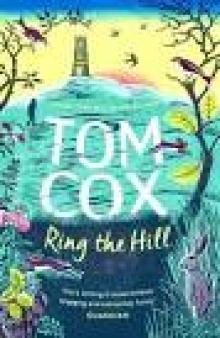 Ring the Hill
Ring the Hill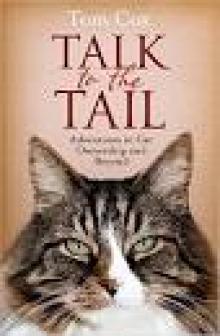 Talk to the Tail
Talk to the Tail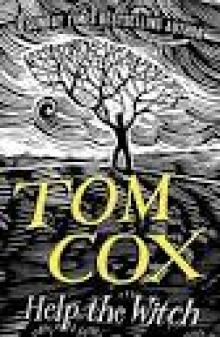 Help the Witch
Help the Witch Educating Peter
Educating Peter Nice Jumper
Nice Jumper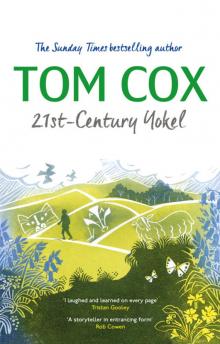 21st-Century Yokel
21st-Century Yokel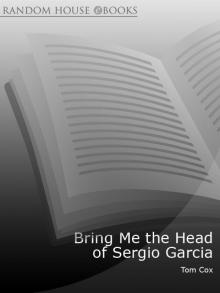 Bring Me the Head of Sergio Garcia
Bring Me the Head of Sergio Garcia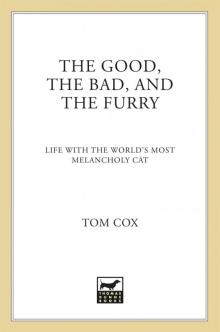 The Good, the Bad, and the Furry
The Good, the Bad, and the Furry